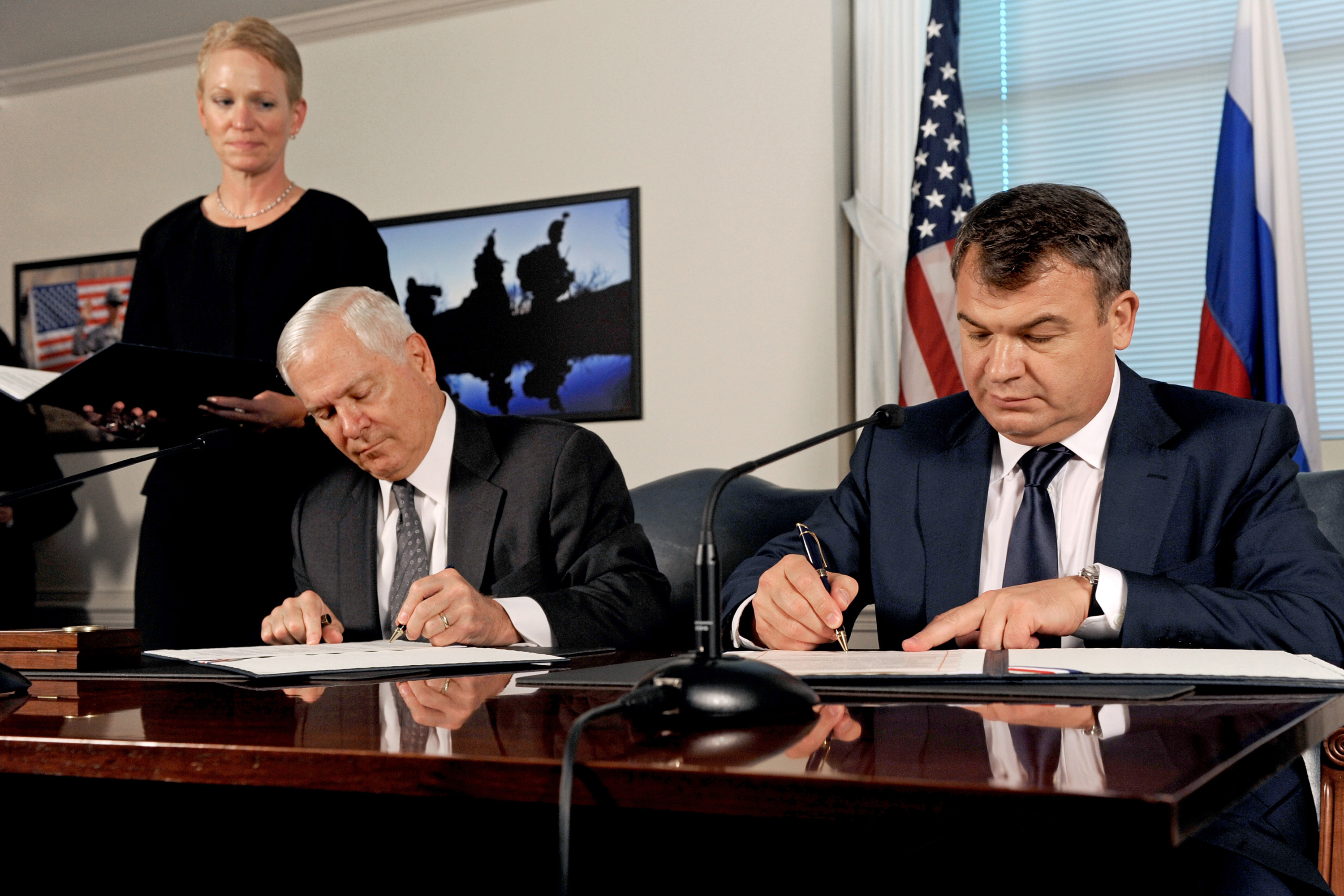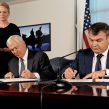
Gates and Serdyukov Agree On Closer US-Russian Defense Cooperation
Publication: Eurasia Daily Monitor Volume: 7 Issue: 169
By:

Since the reform of the Russian conventional armed forces began in late 2008, Moscow has proved cautious, even reluctant, to enter defense assistance agreements with NATO member states that would support its modernization drive. To date, the underlying message has been clear: this is a Russian reform and foreign assistance is unwelcome. Such was the experience of NATO Secretary-General, Anders Fogh Rasmussen, during his visit to Moscow in December 2009, as Defense Minister, Anatoliy Serdyukov, withdrew from meeting him at short notice. However, on September 15-16, responding to an invitation from his US counterpart, Robert Gates, Serdyukov arrived in Washington for discussions on defense cooperation, the international security environment and signed a memorandum of understanding, replacing the earlier 1993 document, and an additional agreement that forms the foundation for further military cooperation (Novoyye Izvestiya, September 16).
A joint plan to form two working groups on defense cooperation was agreed, and according to Pentagon sources a large number of activities will be developed including bilateral military exercises and a variety of programs. The agreement will facilitate the annual renewal of a bilateral defense cooperation package, approved by the Chairman of the US Joint Chiefs of Staff and the Russian Chief of the General Staff, reflecting the findings and recommendations of the joint working group. Serdyukov commented that this framework is being taken seriously by Moscow, not least since it avoids theoretical discussion and concentrates on practical defense assistance, and observed that his visit to Washington will lend “serious impetus to the development of cooperation between the two countries’ defense departments” (Interfax, September 15).
Serdyukov’s Spokeswoman, Irina Kovalchuk, stated that both sides discussed approaches to reforming their national armed forces, strategic stability, missile defense, the strategic arms reduction treaty (START III), anti-piracy and regional security problems in Afghanistan, Central Asia and the South Caucasus. Such bilateral defense discussions, rare in recent years, will now become commonplace, with regular meetings at ministerial level. Gates was also invited by his counterpart to visit Moscow (Interfax, September 16, 17).
Reporting within Russian media on the bilateral meeting was broadly positive, though stressing that Serdyukov had adopted a tough line on several issues. Serdyukov noted that Washington and Moscow will create a three-tiered system of cooperation on missile defense: involving experts, chiefs of the Joint Staff and General Staff and defense minister levels, before being presented to either president for a political decision. This mirrors the principle followed during the negotiations that led to the signing of START III. Serdyukov, however, was realistic on the difficult nature of these contacts relating to missile defense cooperation, explaining that although Moscow wants to become involved in the process the fundamental difference persists, namely that while Washington and its allies maintain that these plans pose no threat to Russia, this assessment is not shared by Moscow. Meanwhile, Moscow is pushing for closer work on the joint assessment of missile threats initiated in 2009, “Let us analyze them (threats) and assess where they are coming from. And only then can it be decided how to close these threats and whether it is necessary to deploy the missile shield where planned, or whether some other ways can be found,” Serdyukov said (Interfax, September 17).
There are additional areas, discussed during the talks between Gates and Serdyukov, which will present major challenges, not least the reminder by the former that Russia must return to the conventional forces in Europe treaty (CFE). Serdyukov stated that Russia will not rejoin the CFE treaty unless NATO accepts Moscow’s terms, characterized as “corresponding to present realities” suggesting that progress on this might prove arduous, “We shall see whether our partners are ready for that, but we do not change our position and we have stated the moratorium will continue until they accept our terms and offer variants that suit us. There should be no haste on the issue” (ITAR-TASS, September 17). This robust approach was equally underscored by Serdyukov announcing late last week that Moscow intends to honor a 2007 arms deal with Syria, which Washington fears might potentially destabilize the Middle East, involving a $300 million sale of the P-800 Yakhont anti-ship cruise missiles (possibly geared towards the protection of the Russian naval site at Tartus) (RIA Novosti, September 17).
Serdyukov visited the Naval Academy in Annapolis and a US army base. In terms of the signals deduced in Moscow as a result of the bilateral meeting, Kommersant highlighted that Washington gave Serdyukov the “red carpet” treatment, unusual at defense minister levels, especially the ceremonial dinner in honor of the Russian defense minister aboard a US navy warship anchored on the Potomac. Moreover, during their three official meetings, Kommersant reported that Gates and Serdyukov discussed military reform issues for several hours, and speculated on its possible import. Moscow is also interested in reaching agreement with Washington on building new large transport aircraft based upon the AN-124 Ruslan and the sale of Mi-17 helicopters to the US navy (Kommersant, September 16).
In the narrower field of defense assistance that might facilitate the success of Serdyukov’s military reform, there were additional signals, such as encouraging Russian access to US non-commissioned officer courses, helping with reforming officers and military education. The framework now in place will permit annual revision and adjustment to such initiatives and opens an opportunity for Russian defense planning staffs, should they choose to pursue such meaningful defense cooperation. Moscow will scrutinize US motives and interests in opening these cooperative avenues, however, other than confidence building and promoting dialogue, the dividend from closely assisting Russian defense reform will depend upon three critical factors. Russian political, military and security elites must first determine the parameters of such defense cooperation, assessing whether there is actually value added in entering into military assistance programs. Moreover, both sides must be sensitive to the lack of Russian interest in benefitting from genuine defense assistance programs in the past, often personnel were sent on visits or to courses while showing little real interest. Finally, those planning and devising programs to help Russian defense reform will need a thorough understanding of the shortcomings of similar US programs elsewhere in the former Soviet Union, in order to rectify inherent weaknesses within the planning and delivery of these niche assistance initiatives. For example, none of the officers in the Kazakh armed forces that were granted access to West Point continue to serve in the military. However, making the Gates-Serdyukov agreement bear fruit will demand joint sustained political will and expertise to overcome many barriers.




